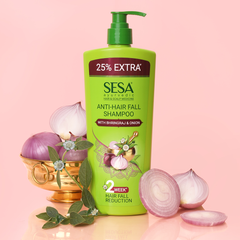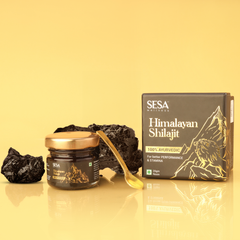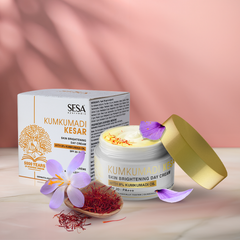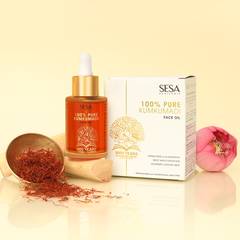The season of rain is here. And as much as most people love rainfall, it's impossible to ignore the damage that it causes to the hair. For some, rainfall and Hair Loss are almost synonymous. Ayurveda suggests that hair & scalp-related problems arise as soon as the equilibrium state of Vata, Pitta, and Kapha doshas energies are disturbed.
Usually, at this time, the internet is flooded with monsoon hair care tips and hacks to safeguard hair from this weather, which is essential too. But what exactly does this weather do that makes our hair & scalp dread it? This article is an attempt to help you understand it better.
Reason Why Your Scalp Itches
During monsoon, the overall humidity level around us increases. And even our hair can't escape it. The dampness in our hair and the moisture content in the air creates an ideal temperature for bacteria to grow. When our scalp becomes the breeding ground for these bacterias, we face problems like scalp itchiness, redness, and flaky scalp.
What's Causing All The Hair Fall?
During the monsoon, our hair absorbs a lot of moisture from humid air. But since the proteins in our hair are unevenly distributed throughout every inch, one part of the hair might absorb the water and swell up while the other remains the same. This irregular absorption makes hair brittle and more prone to breakage causing monsoon hair fall.
Is Your Hair Getting Frizzier?
One problem that holds us back from enjoying the monsoon is Frizzy hair. But why does hair get frizzy in the monsoon? Let’s understand.
Our hair essentially has three layers. The outermost layer is the cuticle. Your hair appears smooth and shiny as long as the cuticle is flat. But during monsoon, the humidity in the air around us increases. Our hair is naturally porous and absorbs the moisture around us. This causes the cuticle to swell up. The cuticle lifts up as soon as you brush your dry and humid hair. Thus giving hair a frizzy, uneven look. It can also make your hair appear folded or fluffy at the ends.
What to Include in your Monsoon Hair Care Routine ?
Contrary to popular belief, the scalp can get very dry during the monsoon. Using the right Ayurvedic Oil and massaging your scalp with it increases blood circulation in hair follicles. Oiling will deeply nourish your hair and keep scalp infections at bay.
Sesa's Onion Oil has the ayurvedic power of onion, bhringraj, and pure cold-pressed oils of olive, jojoba (rich in vitamin C, B &E), hibiscus (rich in amino acids which is the building block of keratin) and grapeseed set this oil apart from other onion oils. The combination of these powerful ingredients helps boost hair growth and repair hair damage. Unlike other onion oils in the market it contains zero percent mineral oil.

Washing hair every time it comes in contact with rainwater is a must. Use gentle Ayurvedic shampoos to wash your hair. You don't want to use chemical-based shampoos as their chemicals can be harsh on your scalp and strip off its natural oil. Mild Ayurvedic shampoos, on the other hand, gently clean the scalp and protect your scalp's natural oils while moisturizing it. They make your hair follicles strong and maintain the ph levels of the scalp. They also help repair itchy, and dry scalp, a common hair problem during monsoon.

Use microfiber towels to dry your hair and keep them dry as much as possible. Stay away from electric dryers as they will only increase the damage and remove your hair's natural shine.
We hope this article helps you enjoy the season of rain and help you welcome it with open arms and beautiful hair.




























